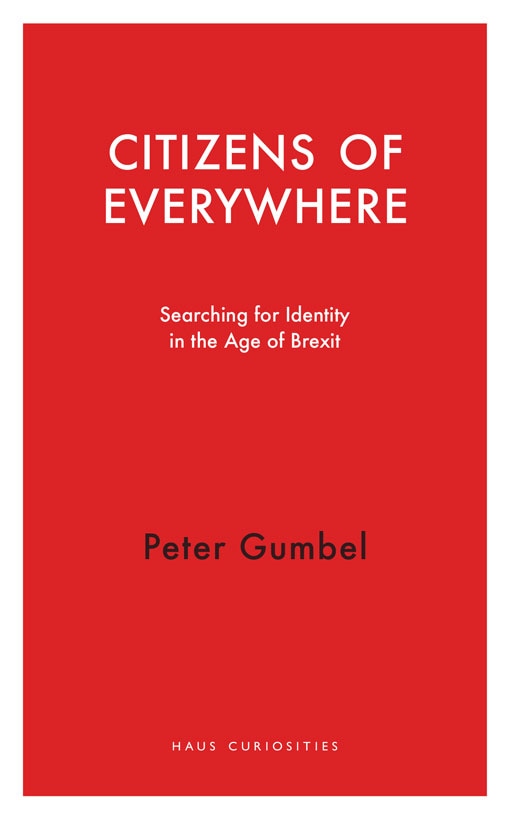In this edition of Author Talks, McKinsey Global Publishing’s Eleni Kostopoulos chats with Peter Gumbel, editorial director of the McKinsey Global Institute. In his latest book, Citizens of Everywhere: Searching for Identity in the Age of Brexit (Haus Publishing, 2020), the Paris-based award-winning journalist draws on his family’s migration stories to explore the nature of belonging amid cycles of pluralism and nationalism. An edited version of the interview follows.
What are the key issues you want to raise in this book?

In these unsettled times, many individuals and companies are taking a closer look at their values and purpose. This book-length essay is my personal exploration of those questions. It focuses on the essential issues of identity and belonging.
The starting point was my decision to acquire a new European nationality after the UK’s Brexit referendum in 2016. I live in Paris and, as a British citizen, I would have faced bureaucratic hassles to be able to continue working here after Britain withdrew from the European Union. I also would have lost my freedom of movement across the rest of the EU.
My grandparents were stripped of their German nationality when they fled Nazi Germany in 1939, and, under the postwar German constitution, that made me eligible to apply for German citizenship. Doing so meant closing an 80-year cycle of family history—and that required a lot of soul-searching. I needed to take a close look at myself and my values, as well as at the reality of both Germany and Britain today. The exercise was well worth the effort. I feel that I have brought closure to a part of my family history that was so painful it remained taboo for many years. At the same time, it gave me a better understanding of the changing nature of identity in our digital age, and made me appreciate all the more the values of freedom, tolerance, and justice that my grandparents yearned for in their darkest hours.
History is a great teacher
What surprised you most about writing this book—whether in the research, writing, or response?
A large stash of documents relating to my mother’s family going back three generations formed the bulk of my historical research. The most poignant are letters my grandfather wrote to his business contacts around Europe in October 1938, searching for a job that would enable him to leave Germany.
He knew his situation was dire: he had just put his son on a Kindertransport train to get him out of Germany to an unknown destination and had essentially given away the family company to avoid it being confiscated. He didn’t yet know it, but he would be arrested during the Kristallnacht pogrom on November 9, 1938. Yet reading his letters, you can only guess at the drama of his situation. He writes in a very controlled and genteel way that betrays almost no hint of emotion. During the ten days he spent in jail, my grandmother followed up with the correspondence, but she gave almost nothing away about her very real worries. No matter how often I read those letters, I continue to find that extraordinary.
You write, ‘mobility is freedom.’ How has the COVID-19 crisis threatened that freedom?
You often only truly appreciate something when you lose it. Early in my career, I worked as a journalist in the Soviet Union and experienced Berlin, both West and East, before the fall of the wall. That left me with a heightened sense of the importance of free movement.
With COVID-19, our ability to move has understandably been restricted: during the lockdowns in France, we can’t go far from our homes and need a written justification for why we are out. That is claustrophobic, and it has made me appreciate all the more the extraordinary freedom of movement we have enjoyed in Europe over the past 35 years, ever since the Schengen Agreement removed border controls between most countries. A critical question once this pandemic abates is whether we will be able to return to the way it was beforehand. That’s important not just for our own personal ability to move around Europe, but also for trade and the economy more broadly.
The seamless cross-border flow of goods, services, finance, and people is a key achievement of the European Union, and in my opinion, it is essential to maintain and strengthen it. But not everyone shares that view, and with the pandemic, the pressures to curtail freedom of movement will only increase.
Social media: Friend or foe?
In many ways, your book is about the nature of belonging. How has social media changed the way we shape our identities and, subsequently, how we belong?
The social history of the past half century in the US and Europe has been marked by personal empowerment and, increasingly, by the assertion of multiple identities, from our gender and sexuality to our ethnic or religious background, and even our dietary habits. The internet and social media in particular have amplified and accelerated these trends. These technologies are the great cross-border connectors that enable the unencumbered expression of our multiplicity. They link people based on their passions and idea of self, whether it be for golf, chess, vegan recipes, or book collecting. You can be a member of a British-born Chinese-food group or an Irish Latvian-folk-dancing community, or both at the same time.
It just takes seconds to upload a video, photo, or comment and disseminate it worldwide. In this context, I argue that national identity has lost some of its relevance. It is as if our user IDs and passwords for services like Facebook, Twitter, and Instagram have become as important as our passports in determining who we are and the company we keep. As we have seen, these networks are also breeding grounds of misinformation and abuse, and they can destroy self-confidence as easily as they build it up. Yet we are hooked.
Igniting purpose
You write about the importance of fighting for the principles of diversity, of tolerance, and of openness. What advice would you give to corporations that are on a quest to weave these principles into their DNA?
To be credible, you have to go beyond principles and put in place very tangible measures. For diversity, that starts with recruiting—but we also know that it doesn’t stop there; all too often, diversity at the entry level doesn’t lead to more diverse middle or senior management. You need to take a close look at the obstacles to promotion and address them head-on. Fostering greater tolerance and openness are primarily questions of management style and values. You can achieve that with a focus on teamwork and creativity, but they need to take place in a context of nonhierarchical leadership. Being open to other ideas and respecting other opinions needs to be the rule rather than the exception.
[Multiple] small steps can be powerful—and certainly more effective than grandiose declarations that are not followed up.
The biggest lesson for me from my own family history is that multiple small steps can be powerful—and certainly more effective than grandiose declarations that are not followed up. My great grandfather, a highly successful entrepreneur who built a textile business in the late 19th century, saw it as self-evident that he needed to spread the wealth he created, both to his workers and to the German community in which he lived. He set up a health insurance plan for all employees, subsidized a local children’s hospital, and funded city parks and the construction of a beautiful art deco theater that still stands. Some 120 years later, stakeholder capitalism is back on the corporate agenda, and the principles of respect and community that guided him are as relevant and necessary as ever.


